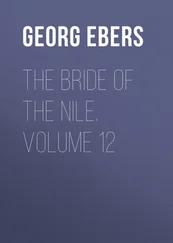Georg Ebers - The Bride of the Nile. Complete
Здесь есть возможность читать онлайн «Georg Ebers - The Bride of the Nile. Complete» — ознакомительный отрывок электронной книги совершенно бесплатно, а после прочтения отрывка купить полную версию. В некоторых случаях можно слушать аудио, скачать через торрент в формате fb2 и присутствует краткое содержание. Жанр: foreign_prose, literature_19, foreign_antique, на английском языке. Описание произведения, (предисловие) а так же отзывы посетителей доступны на портале библиотеки ЛибКат.
- Название:The Bride of the Nile. Complete
- Автор:
- Жанр:
- Год:неизвестен
- ISBN:нет данных
- Рейтинг книги:4 / 5. Голосов: 1
-
Избранное:Добавить в избранное
- Отзывы:
-
Ваша оценка:
- 80
- 1
- 2
- 3
- 4
- 5
The Bride of the Nile. Complete: краткое содержание, описание и аннотация
Предлагаем к чтению аннотацию, описание, краткое содержание или предисловие (зависит от того, что написал сам автор книги «The Bride of the Nile. Complete»). Если вы не нашли необходимую информацию о книге — напишите в комментариях, мы постараемся отыскать её.
The Bride of the Nile. Complete — читать онлайн ознакомительный отрывок
Ниже представлен текст книги, разбитый по страницам. Система сохранения места последней прочитанной страницы, позволяет с удобством читать онлайн бесплатно книгу «The Bride of the Nile. Complete», без необходимости каждый раз заново искать на чём Вы остановились. Поставьте закладку, и сможете в любой момент перейти на страницу, на которой закончили чтение.
Интервал:
Закладка:
“Well—then?”
“Only look at him, Betta; see how he lies as cold as marble, rigid and apathetic, half dead and half alive. At first the words often rose to my lips…”
“And now?”
“Now all the worst is so long past; I feel I have forfeited the right to complain to him of all that weighs me down.”
“Hm,” said Perpetua who had no answer ready. “But take heart, my child. Orion has at any rate learnt how far he may venture. You can hold your head high enough and look cool enough. Bear all that cannot be mended, and if an inward voice does not deceive me, he whom we seek…”
“That was what brought me here. Are none of our messengers returned yet?”
“Yes, the little Nabathaean is come,” replied her nurse with some hesitation, “and he indeed—but for God’s sake, child, form no vain hopes! Hiram came to me soon after sun-down…”
“Betta!” screamed the girl, clinging to her nurse’s arm. “What has he heard, what news does he bring?”
“Nothing, nothing! How you rush at conclusions! What he found out is next to nothing. I had only a minute to speak to Hiram. To-morrow morning he is to bring the man to me. The only thing he told me…”
“By Christ’s Wounds! What was it?”
“He said that the messenger had heard of an elderly recluse, who had formerly been a great warrior.”
“My father, my father!” cried Paula. “Hiram is sitting by the fire with the others. Fetch him here at once—at once; I command you, Perpetua, do you hear? Oh best, dearest Betta! Come with me; we will go to him.”
“Patience, sweetheart, a little patience!” urged the nurse. “Ah, poor dear soul, it will turn out to be nothing again; and if we again follow up a false clue it will only lead to fresh disappointment.”
“Never mind: you are to come with me.”
“To all the servants round the fire, and at this time of night? I should think so indeed!—But do you wait here, child. I know how it can be managed.
“I will wake Hiram’s Joseph. He sleeps in the stable yonder—and then he will fetch his father. Ah! what impatience! What a stormy, passionate little heart it is! If I do not do your bidding, I shall have you awake all night, and wandering about to-morrow as if in a dream.—There, be quiet, be quiet, I am going.”
As she spoke she wrapped her kerchief round her head and hurried out; Paula fell on her knees before the crucifix over the bed, and prayed fervently till her nurse returned, Soon after she heard a man’s steps on the stairs and Hiram came in.
He was a powerful man of about fifty, with a pair of honest blue eyes in his plain face. Any one looking at his broad chest would conclude that when he spoke it would be in a deep bass voice; but Hiram had stammered from his infancy; and from constant companionship with horses he had accustomed himself to make a variety of strange, inarticulate noises in a high, shrill voice. Besides, he was always unwilling to speak. When he found himself face to face with the daughter of his master and benefactor, he knelt at her feet, looked up at her with faithful, dog-like eyes full of affection, and kissed first her dress, and then her hand which she held out to him. Paula kindly but decidedly cut short the expressions of delight at seeing her again which he painfully stammered out; and when he at length began to tell his story his words came far too slowly for her impatience.
He told her that the Nabathaean who had brought the rumor that had excited her hopes, was not unwilling to follow up the trace he had found, but he would not wait beyond noon the next day and had tried to bid for high terms.
“He shall have them—as much as he wants!” cried Paula. “But Hiram entreated her, more by looks and vague cries than by articulate words, not to hope for too much. Dusare the Nabathaean—Perpetua now took up the tale—had heard of a recluse, living at Raithu on the Red Sea, who had been a great warrior, by birth a Greek, and who for two years had been leading a life of penance in great seclusion among the pious brethren on the sacred Mount of Sinai. The messenger had not been able to learn what his name in the world had been, but among the hermits he was known as Paulus.”
“Paulus!” interrupted the girl with panting breath. “A name that must remind him of my mother and of me, yes, of me! And he, the hero of Damascus, who was called Thomas in the world, believing that I was dead, has no doubt dedicated himself to the service of God and of Christ, and has taken the name of Paulus, as Saul, the other man of Damascus did after his con version,—exactly like him! Oh! Betta, Hiram, you will see: it is he, it must be! How can you doubt it?”
The Syrian shook his head doubtfully and gave vent to a long-drawn whistle, and Perpetua clasped her hands exclaiming distressfully: “Did I not say so? She takes the fire lighted by shepherds at night to warm their hands for the rising sun—the rattle of chariots for the thunders of the Almighty!—Why, how many thousands have called themselves Paulus! By all the Saints, child, I beseech you keep quiet, and do not try to weave a holiday-robe out of airy mist! Be prepared for the worst; then you are armed against failure and preserve your right to hope! Tell her, tell her, Hiram, what else the messenger said; it is nothing positive; everything is as uncertain as dust in the breeze.”
The freedman then explained that this Nabathaean was a trustworthy man, far better skilled in such errands than himself, for he understood both Syriac and Egyptian, Greek and Aramaic; and nevertheless he had failed to find out anything more about this hermit Paulus at Tor, where the monks of the monastery of the Transfiguration had a colony. Subsequently, however, on the sea voyage to Holzum, he had been informed by some monks that there was a second Sinai. The monastery there—but here Perpetua again was the speaker, for the hapless stammerer’s brow was beaded with sweat—the monastery at the foot of the peaked, heaven-kissing mountain, had been closed in consequence of the heresies of its inhabitants; but in the gorges of these great heights there were still many recluses, some in a small Coenobium, some in Lauras and separate caves, and among these perchance Paulus might be found. This clue seemed a good one and she and Hiram had already made up their minds to follow it up; but the warrior monk was very possibly a stranger, and they had thought it would be cruel to expose her to so keen a disappointment.
Here Paula interrupted her, crying in joyful excitement:
“And why should not something besides disappointment be my portion for once? How could you have the heart to deprive me of the hope on which my poor heart still feeds?—But I will not be robbed of it. Your Paulus of Sinai is my lost father. I feel it, I know it! If I had not sold my pearls, the Nabathaean.... But as it is. When can you start, my good Hiram?”
“Not before a fort—a fortnight at—at—at—soonest,” said the man. “I am in the governor’s service now, and the day after to-morrow is the great horse-fair at Niku. The young master wants some stallions bought and there are our foals to....”
“I will implore my uncle to-morrow, to spare you,” cried Paula. “I will go on my knees to him.”
“He will not let him go,” said the nurse. “Sebek the steward told him all about it from me before the hour of audience and tried to have Hiram released.”
“And he said…?”
“The lady Neforis said it was all a mere will-o’-the-wisp, and my lord agreed with her. Then your uncle forbade Sebek to betray the matter to you, and sent word to me that he would possibly send Hiram to Sinai when the horse-fair was over. So take patience, sweetheart. What are two weeks, or at most three—and then....”
Читать дальшеИнтервал:
Закладка:
Похожие книги на «The Bride of the Nile. Complete»
Представляем Вашему вниманию похожие книги на «The Bride of the Nile. Complete» списком для выбора. Мы отобрали схожую по названию и смыслу литературу в надежде предоставить читателям больше вариантов отыскать новые, интересные, ещё непрочитанные произведения.
Обсуждение, отзывы о книге «The Bride of the Nile. Complete» и просто собственные мнения читателей. Оставьте ваши комментарии, напишите, что Вы думаете о произведении, его смысле или главных героях. Укажите что конкретно понравилось, а что нет, и почему Вы так считаете.












